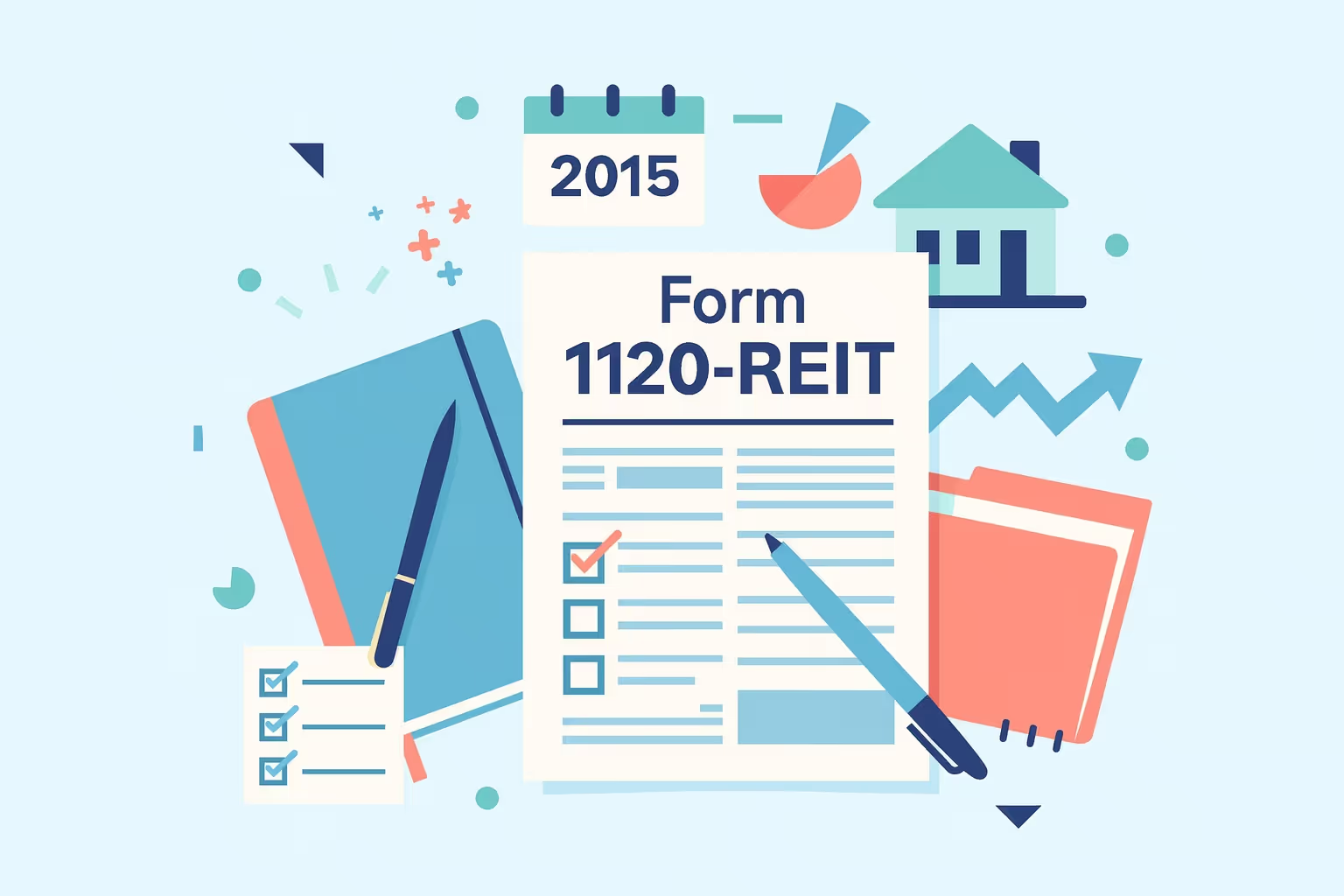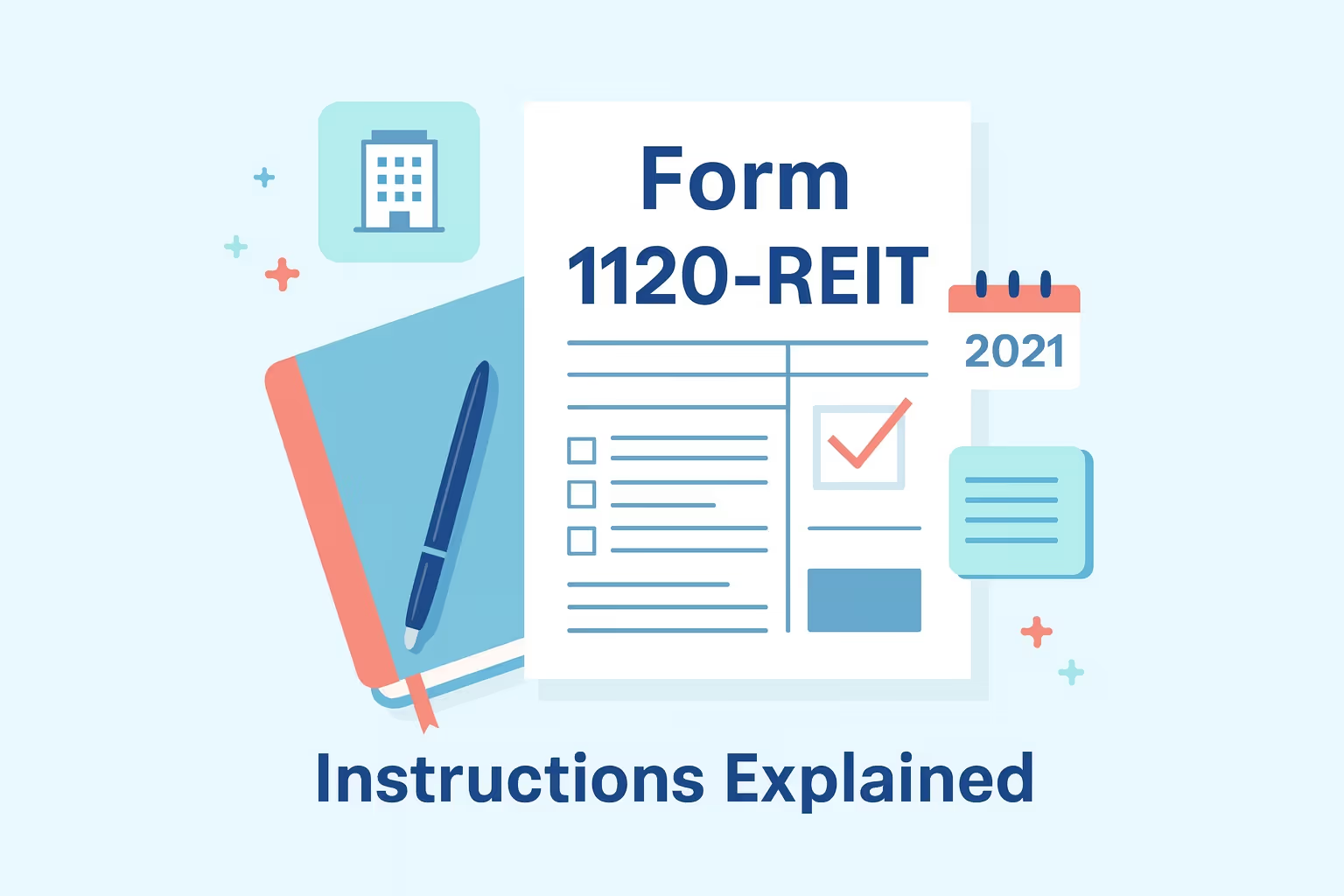
Real estate investment trusts must comply with strict federal tax filing rules. The Internal Revenue Service issues specific instructions for Form 1120 REIT, which acts as the corporate income tax return for these entities. Understanding the process ensures compliance and avoids penalties while maintaining REIT status.
The 2018 tax year included important changes that affect how REITs invest, report taxable income, and calculate deductions. These adjustments influenced corporate income taxes, capital gains taxes, and ordinary income reporting, directly impacting REIT investors and shareholders.
This guide explains how REITs file Form 1120 REIT, details relevant updates for 2018, and outlines essential filing steps. It covers taxable income, REIT distributions, dividends, and the tax treatment of equity and mortgage REITs. It also highlights common mistakes to avoid and the potential benefits of accurate tax return filing.
Overview of Form 1120 REIT 2018 Instructions
Form 1120 REIT is the income tax return for every corporation or trust electing REIT status. It provides a structured way to calculate income tax liability and report taxable earnings. Entities must complete every section thoroughly, as failure to comply may subject them to penalties and additional taxation.
Purpose of the Form
- Income reporting: The form reports taxable income, ordinary income, capital gains, deductions, and REIT dividends, ensuring accurate REIT taxation.
- IRS compliance: The Internal Revenue Service requires REITs to complete the return yearly to confirm their tax treatment and continued REIT status.
- Investor accountability: A complete filing reassures REIT investors that the entity qualifies legally and complies with corporate income taxes and reporting rules.
Who Must File Form 1120 REIT
- Corporations and trusts: Any corporation, trust, or association electing REIT status must file Form 1120 REIT annually.
- Qualified REITs: Filing applies if the entity owns real estate assets, REIT shares, mortgages, or other income-producing real estate investments.
- Ongoing compliance: Entities that qualified in prior years must continue filing unless their election was revoked or legally terminated by the IRS.
What’s New for 2018 in REIT Taxation
The 2018 instructions introduced several tax benefits and requirements that REITs needed to consider. These changes affected REIT distributions, income reporting, and the calculation of taxable earnings.
Changes in Foreign Income Rules
- Qualifying inclusions: Foreign income is now treated as qualifying income for the 95% gross income test, benefiting REIT investors with international property.
- Expanded compliance: REITs investing in foreign property must carefully report gains and income, ensuring their taxable portion meets IRS qualification tests.
Business Interest Limitations
- Form 8990 requirement: REITs deducting business interest must file Form 8990, reporting account details and demonstrating compliance with interest deduction rules.
- Debt-heavy REITs: Mortgage REITs or entities with significant mortgages and bonds must evaluate limitations on deductions and interest expenses.
New Corporate Tax Rate
- Flat 21% rate: Beginning in 2018, REITs pay corporate income taxes at a flat 21% tax rate, simplifying the calculation of income tax liability.
- Investor implications: This lower rate improved potential benefits for REIT investors by reducing taxation on REIT earnings and qualified REIT dividends.
Pre-Filing Preparation for Real Estate Investment Trusts
Before filing, a real estate investment trust must ensure all legal and financial records are accurate. Proper preparation reduces errors, supports deductions, and ensures compliance with the IRS.
Required Information and Records
- Previous tax return: Include the previous income tax return for comparison and carryovers.
- Financial statements: Prepare accounts showing income, gains, REIT distributions, and depreciation of real estate assets.
- Dividend records: Maintain details of dividends, including qualified REIT dividends and REIT distributions subject to taxation.
- Payment records: Track estimated tax payments, interest, and penalties, and ensure all prior obligations are settled.
Organizational and Structural Requirements
- EIN and entity details: Every REIT must report its employer identification number and legal formation details in the filing.
- Corporate structure: Entities must prove they qualify as a corporation or trust managing income-producing real estate or other assets.
- Ownership records: Maintain shareholder account details, as REIT shares ownership affects distributions, potential benefits, and qualification rules.
Completing the Return for Form 1120 REIT
The Internal Revenue Service requires REITs to complete every applicable section of Form 1120 REIT. Each part addresses taxable income, distributions, deductions, and payments that determine overall income tax liability.
Header Information and Initial Details
- Entity information: Report the REIT’s legal name, mailing address, and Employer Identification Number as issued by the IRS, ensuring accurate records are presented.
- Tax year dates: Indicate the beginning and ending dates of the REIT’s tax year, including short tax years for new or restructured real estate investment entities.
- Assets and classification: Disclose the REIT’s total real estate assets, mortgages, bonds, and other property, along with whether it qualifies as an equity REIT or a mortgage REIT.
Part I: Taxable Income Reporting
- Ordinary income: Include rental income, dividends, bond interest, and all other earnings from income-producing real estate activities conducted during the REIT’s reporting year.
- Capital gains: Report all gains realized from sales of property or securities held by the real estate investment trust.
- Deductions: Apply deductions for property depreciation, interest, repairs, and allowable expenses, reducing taxable income while complying with IRS deduction requirements.
Part II: Capital Gains and Losses
- Transactions: List all sales and exchanges involving REIT shares, mortgages, or property that generate taxable gains or losses, with full supporting documentation attached.
- Tax treatment: Clearly distinguish between short-term and long-term capital gains, since each category carries different tax treatment and affects overall tax benefits for REIT shareholders.
Part III: Tax and Payments
- Tax rate application: Apply the 21 percent corporate tax rate to taxable income, after including deductions, REIT distributions, and dividend-related adjustments required by IRS law.
- Payments: Report estimated payments made throughout the year and credits or refunds carried forward to calculate the REIT’s current income tax liability balance.
Part IV: Other Information
- Ownership details: Answer IRS questions related to shareholder structure, REIT distributions, and compliance with ongoing organizational requirements that maintain valid REIT status.
- Foreign investments: Disclose any foreign property, mortgages, or assets that produced taxable income, dividends, or gains during the REIT’s reporting period to the IRS.
Assembly and Submission Order
- Form sequence: Assemble Form 1120 REIT, all supporting schedules, and additional required statements in the exact sequence prescribed by the Internal Revenue Service.
- Attachments: Ensure that every schedule, depreciation record, or dividend statement clearly lists the REIT’s name and Employer Identification Number for proper IRS identification.
Filing Methods and Deadlines for REIT Income Tax Return
REITs may file their annual income tax return electronically, on paper, or through IRS-approved private delivery services. Each method must meet strict IRS deadlines.
Filing Options
- Electronic filing: Submit Form 1120 REIT using the IRS electronic filing system, which provides faster processing, reduced errors, and easier submission confirmation.
- Paper filing: Mail the completed income tax return to the correct IRS service center, determined by the REIT’s location and reported total asset amount.
- Private delivery: Use only IRS-designated private delivery services, which qualify for the “timely mailing as timely filing” rule and ensure proof of compliance.
Deadlines and Extensions
- Annual deadline: File Form 1120 REIT by the 15th day of the fourth month following the close of the REIT’s tax year, unless extended.
- Short-period returns: As specified by IRS rules, newly established REITs must file by the same deadline following the close of their initial short tax year.
- Extensions: File IRS Form 7004 to request an automatic six-month extension, which extends the filing but does not extend deadlines for required tax payments.
Signature Requirements
- Corporate officers: The president, vice president, treasurer, or another authorized corporate officer must sign Form 1120 REIT on behalf of the REIT entity.
- Accuracy confirmation: The authorized officer certifies that all taxable income, dividends, capital gains, deductions, and reported information are accurate, complete, and supported by financial records.
Payments and Estimated Taxes for REITs
The IRS requires REITs to pay corporate income taxes electronically through approved systems. Proper payments prevent interest charges, minimize penalties, and demonstrate full compliance.
Electronic Payment Requirements
- EFTPS system: Enroll in the Electronic Federal Tax Payment System to submit federal corporate tax deposits, ensuring payments are scheduled and received before official deadlines.
- Same-day wire: For urgent payments, use the IRS same-day wire, which requires specific banking instructions and coordination with financial institutions.
Installment Agreements
- Eligibility: Corporations must request an installment agreement through the IRS using the appropriate procedures; online options and thresholds vary by entity and tax type.
- Process: Apply online through the IRS website. The IRS will review payment history and financial accounts before granting or denying installment arrangements.
Estimated Tax Payments
- Quarterly schedule: REITs expecting to owe $500 or more in income taxes must make quarterly estimated tax payments during the year to remain compliant.
- Due dates: Estimated quarterly payments are due on the 15th day of the fourth, sixth, ninth, and twelfth months of the REIT’s tax year.
Required Schedules and Attachments for REIT Filing
Form 1120 REIT requires several schedules and attachments to verify taxable income, REIT dividends, capital gains, and deductions claimed during the tax year.
Mandatory Schedules
- Schedule A: This schedule reports deductions for REIT dividends paid, including REIT distributions declared in the fourth quarter that qualify as paid during the prior year.
- Schedule J: This schedule calculates the REIT’s corporate income tax liability by applying the 21 percent corporate tax rate to taxable income after deductions and adjustments.
- Schedule K: This schedule provides detailed information about the REIT’s legal structure, activities, shareholder composition, and property holdings to confirm IRS qualification rules are satisfied.
- Schedule L: This schedule presents the beginning and ending balance sheets per books, covering real estate assets, mortgages, bonds, and other investments owned by the REIT.
- Schedule M-1: This schedule reconciles book income with taxable income, identifying differences caused by depreciation, interest deductions, and other REIT taxation adjustments.
Conditional Schedules and Forms
- Form 2438: This form reports undistributed capital gains retained by the REIT and calculates corporate taxes owed on those retained earnings, as IRS law requires.
- Form 8990: File this form if the REIT claims business interest expense deductions, demonstrating compliance with section 163(j) limitations and applicable IRS rules.
- Form 5471: This form reports ownership in foreign corporations where the REIT has control or significant interest, providing detailed taxable earnings and distributions received.
- Form 5472: This form discloses transactions with related foreign persons or entities, ensuring complete IRS reporting of taxable income or deductible expenses from foreign operations.
- Form 8865: This form reports REIT ownership interests in foreign partnerships that produce taxable income, capital gains, or dividends, including detailed account records and financial disclosures.
REIT Qualification Tests
Every REIT must meet ongoing qualification tests to maintain REIT status and continue receiving tax benefits. These tests cover organizational structure, ownership requirements, income sources, and asset distribution.
Organizational Requirements
- Legal formation: The REIT must be organized as a corporation, trust, or association, with transferable shares and centralized management by directors or trustees.
- Exempt limitations: The REIT cannot qualify if it operates as an insurance company, financial institution, or other legally excluded entity subject to specific exemptions.
Ownership Tests
- 100-person requirement: Beginning in the second taxable year, a REIT must have at least 100 shareholders to maintain a valid REIT qualification under IRS rules.
- 5/50 rule: Five or fewer individuals may own no more than 50 percent of REIT shares during the last half of the taxable year.
Gross Income Tests
- 95 percent test: At least 95 percent of the REIT’s income must derive from dividends, interest, rents, securities sales, or income-producing real estate.
- 75 percent test: At least 75 percent of the REIT’s income must come from real estate assets, property rents, mortgages, or other qualified real estate investments.
Asset Tests
- Quarterly evaluation: At the end of each quarter, at least 75 percent of a REIT’s assets must be real estate, cash, or government securities.
- Diversification limits: No more than 25 percent of total assets may be invested in non-qualifying securities, with limits on holdings in single issuers.
Distribution Requirements for REITs
REITs must distribute a significant portion of taxable income to shareholders. Distributions determine deductions for dividends paid and confirm compliance with IRS tax treatment rules.
The 90 Percent Distribution Rule
- Minimum threshold: A REIT must distribute at least 90 percent of taxable income, excluding net capital gains, to shareholders as REIT dividends.
- Deduction eligibility: Only dividends meeting IRS standards may be deducted, reducing taxable income and lowering the REIT's overall corporate income taxes owed.
Timing Rules for Distributions
- Fourth-quarter election: Dividends declared in the last quarter and paid by January 31 count as paid in the previous tax year.
- Declared dividends: All declared dividends must be reported, whether classified as ordinary income, capital gain distributions, or nontaxable return of capital.
Types of Distributions
- Ordinary dividends: These dividends are deductible by the REIT and taxable as ordinary income to shareholders, subject to qualified REIT dividends provisions.
- Capital gain dividends: These distributions do not count toward the 90 percent requirement but remain taxable as capital gains for shareholders receiving them.
- Return of capital: A portion may represent a nontaxable return of capital, reducing shareholder cost basis until REIT shares are eventually sold.
Excise Tax on Undistributed Income
A REIT that does not distribute sufficient income may be subject to excise tax. This ensures investors receive distributions and prevents REITs from stockpiling profits.
Section 4981 Excise Tax
- Tax calculation: The excise tax is equal to four percent of the excess between the required distribution amount and actual REIT distributions paid during the calendar year.
- Required distribution: This includes 85 percent of ordinary income, 95 percent of capital gains, and 100 percent of undistributed taxable income carried forward.
Form 8612 Requirements
- Mandatory filing: If subject to excise tax, a REIT must file IRS Form 8612 and remit payment by March 15 following the calendar year.
- No extensions: Unlike income tax returns, no filing extensions are available for excise tax, requiring careful planning and timely distributions each year.
Zero Activity or Dormant REIT Filing
Even inactive REITs with no income must still comply with IRS filing rules. Maintaining REIT status requires filing Form 1120 REIT annually unless the election is terminated.
Dormant REIT Requirements
- Filing obligations: An inactive REIT must file a complete return, attach required schedules, and disclose minimal income or expenses incurred during the year.
- Compliance checklists: Without income, dormant REITs must maintain organizational structure, shareholder minimums, and other compliance obligations under IRS law.
Terminating REIT Election
- Voluntary termination: A REIT may choose to terminate its REIT election if it will remain permanently inactive, preventing unnecessary filing obligations in future years.
- IRS procedures: Proper termination requires following the IRS instructions to revoke REIT status, ensuring no further corporate obligations to file annual REIT income tax returns.
First-Time Filer Tips for REITs
When filing Form 1120 REIT, newly established REITs must meet initial compliance requirements. Early preparation helps avoid penalties, errors, or loss of REIT qualification.
Making the REIT Election
- Automatic election: No separate election form exists. Filing Form 1120 REIT and calculating taxable income as a REIT is the official election.
- IRS recognition: The IRS considers a REIT valid once the return is filed correctly, provided the entity meets all structural and ownership qualifications.
Short Period Returns
- Initial filings: A newly formed REIT may file a short-period return covering fewer than 12 months, with deadlines identical to standard annual filings.
- Filing deadline: Short-period returns must be filed by the 15th day of the fourth month following the close of the REIT’s short taxable year.
Common First-Year Issues
- EIN status: If the REIT has applied for an Employer Identification Number but has not yet received it, enter “Applied For” in the EIN field.
- Qualification delays: Ownership tests such as the 100-person minimum and 5/50 closely held rule do not apply until the second taxable year of operation.
Common Mistakes to Avoid When Filing a REIT Tax Return
REITs frequently make avoidable errors when completing Form 1120 REIT. Careful review of income tax return details helps prevent penalties, delays, or IRS audits.
Frequent Filing Errors
- Incomplete entries: Never enter “See Attached.” All fields must contain numbers, explanations, or zeros to comply with IRS corporate filing standards.
- EIN mistakes: Ensure the Employer Identification Number is correct and consistent across all REIT schedules, attachments, and reported dividend statements.
- Unsigned returns: An unsigned return is considered incomplete. The REIT must have a corporate officer’s signature to validate its annual tax return.
REIT-Specific Pitfalls
- Distribution compliance: Failure to distribute 90 percent of taxable income can result in termination of REIT status and loss of critical tax benefits.
- Qualification rules: Monitor organizational, ownership, asset, and income tests closely to ensure compliance with IRS requirements for maintaining REIT qualification.
- Recordkeeping lapses: Maintain records for at least three years, covering earnings, dividends, depreciation, and shareholder distributions to support taxable income calculations.
Frequently Asked Questions
What is the filing deadline for Form 1120 REIT in 2018?
The filing deadline is generally the 15th day of the fourth month after the REIT’s tax year ends. For calendar year REITs, the deadline was April 15, 2019. An automatic six-month extension is available by filing Form 7004, but it extends the filing only and does not extend deadlines for tax payments due.
How do REITs make the official election with the IRS?
REITs make the election by filing Form 1120 REIT and calculating taxable income under REIT rules. No separate election form is required. The IRS recognizes the election when the return is filed. REITs must still satisfy organizational and ownership qualifications to maintain REIT status and receive tax benefits associated with compliance.
What income qualifies under the REIT gross income tests?
The 95 percent test requires most income from dividends, interest, securities, or real estate investment activities. The 75 percent test requires most income to come specifically from real estate assets, property rents, mortgages, or gains from real estate sales. For 2018, certain foreign inclusions qualified as income under updated IRS rules for REITs.
How are REIT dividends taxed for shareholders?
Ordinary REIT dividends are taxed as ordinary income, while qualified REIT dividends may receive preferential treatment. Capital gain dividends are subject to capital gains taxes. Some distributions may represent a nontaxable return of capital, which reduces shareholder cost basis in REIT shares until they are eventually sold in the market.
What happens if a REIT does not meet distribution requirements?
Failure to distribute at least 90 percent of taxable income may cause the REIT to lose its qualification and become subject to regular corporate income taxes. This includes loss of tax benefits such as dividend deductions. REITs that miss the requirement can use deficiency dividend procedures, but penalties or additional taxation may still apply.
Do dormant REITs still need to file Form 1120 REIT?
Even dormant or inactive REITs with little or no income must file Form 1120 REIT annually. The IRS requires compliance until the REIT election is legally terminated. Filing includes completing required schedules, even if income and activity are minimal. Terminating the election may be an option if the REIT remains permanently inactive.



































